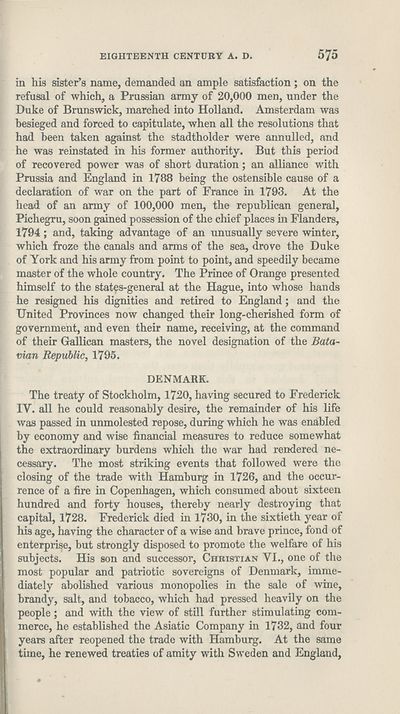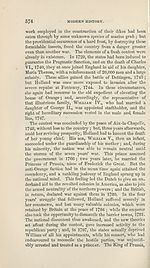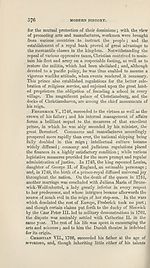Download files
Complete book:
Individual page:
Thumbnail gallery: Grid view | List view

EIGHTEENTH CENTURY A. D.
575
in his sister’s name, demanded an ample satisfaction; on the
refusal of which, a Prussian army of 20,000 men, under the
Duke of Brunswick, marched into Holland. Amsterdam was
besieged and forced to capitulate, when all the resolutions that
had been taken against the stadtholder were annulled, and
he was reinstated in his former authority. But this period
of recovered power was of short duration; an alliance with
Prussia and England in 1788 being the ostensible cause of a
declaration of war on the part of France in 1793. At the
head of an army of 100,000 men, the republican general,
Pichegru, soon gained possession of the chief places in Flanders,
1794; and, taking advantage of an unusually severe winter,
which froze the canals and arms of the sea, drove the Duke
of York and his army from point to point, and speedily became
master of the whole country. The Prince of Orange presented
himself to the status-general at the Hague, into whose hands
he resigned his dignities and retired to England; and the
United Provinces now changed their long-cherished form of
government, and even their name, receiving, at the command
of their Gallican masters, the novel designation of the Bata¬
vian Republic, 1795.
DENMARK.
The treaty of Stockholm, 1720, having secured to Frederick
IV. all he could reasonably desire, the remainder of his life
was passed in unmolested repose, during which he was enabled
by economy and wise financial measures to reduce somewhat
the extraordinary burdens which the war had rendered ne¬
cessary. The most striking events that followed were the
closing of the trade with Hamburg in 1726, and the occur¬
rence of a fire in Copenhagen, which consumed about sixteen
hundred and forty houses, thereby nearly destroying that
capital, 1728. Frederick died in 1730, in the sixtieth year of
his age, having the character of a wise and brave prince, fond of
enterprise, but strongly disposed to promote the welfare of his
subjects. His son and successor, Christian VI., one of the
most popular and patriotic sovereigns of Denmark, imme¬
diately abolished various monopolies in the sale of wine,
brandy, salt, and tobacco, which had pressed heavily on the
people; and with the view of still further stimulating com¬
merce, he established the Asiatic Company in 1732, and four
years after reopened the trade with Hamburg. At the same
time, he renewed treaties of amity with Sweden and England,
575
in his sister’s name, demanded an ample satisfaction; on the
refusal of which, a Prussian army of 20,000 men, under the
Duke of Brunswick, marched into Holland. Amsterdam was
besieged and forced to capitulate, when all the resolutions that
had been taken against the stadtholder were annulled, and
he was reinstated in his former authority. But this period
of recovered power was of short duration; an alliance with
Prussia and England in 1788 being the ostensible cause of a
declaration of war on the part of France in 1793. At the
head of an army of 100,000 men, the republican general,
Pichegru, soon gained possession of the chief places in Flanders,
1794; and, taking advantage of an unusually severe winter,
which froze the canals and arms of the sea, drove the Duke
of York and his army from point to point, and speedily became
master of the whole country. The Prince of Orange presented
himself to the status-general at the Hague, into whose hands
he resigned his dignities and retired to England; and the
United Provinces now changed their long-cherished form of
government, and even their name, receiving, at the command
of their Gallican masters, the novel designation of the Bata¬
vian Republic, 1795.
DENMARK.
The treaty of Stockholm, 1720, having secured to Frederick
IV. all he could reasonably desire, the remainder of his life
was passed in unmolested repose, during which he was enabled
by economy and wise financial measures to reduce somewhat
the extraordinary burdens which the war had rendered ne¬
cessary. The most striking events that followed were the
closing of the trade with Hamburg in 1726, and the occur¬
rence of a fire in Copenhagen, which consumed about sixteen
hundred and forty houses, thereby nearly destroying that
capital, 1728. Frederick died in 1730, in the sixtieth year of
his age, having the character of a wise and brave prince, fond of
enterprise, but strongly disposed to promote the welfare of his
subjects. His son and successor, Christian VI., one of the
most popular and patriotic sovereigns of Denmark, imme¬
diately abolished various monopolies in the sale of wine,
brandy, salt, and tobacco, which had pressed heavily on the
people; and with the view of still further stimulating com¬
merce, he established the Asiatic Company in 1732, and four
years after reopened the trade with Hamburg. At the same
time, he renewed treaties of amity with Sweden and England,
Set display mode to:
![]() Universal Viewer |
Universal Viewer | ![]() Mirador |
Large image | Transcription
Mirador |
Large image | Transcription
| Antiquarian books of Scotland > Education > Elements of universal history on a new and systematic plan > (595) |
|---|
| Permanent URL | https://digital.nls.uk/127587280 |
|---|
| Description | Thousands of printed books from the Antiquarian Books of Scotland collection which dates from 1641 to the 1980s. The collection consists of 14,800 books which were published in Scotland or have a Scottish connection, e.g. through the author, printer or owner. Subjects covered include sport, education, diseases, adventure, occupations, Jacobites, politics and religion. Among the 29 languages represented are English, Gaelic, Italian, French, Russian and Swedish. |
|---|

